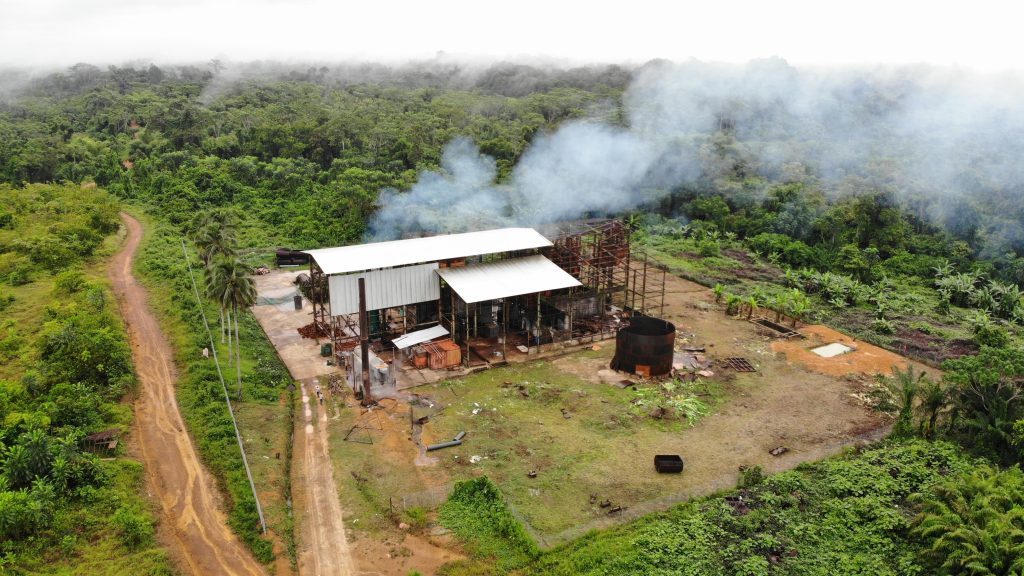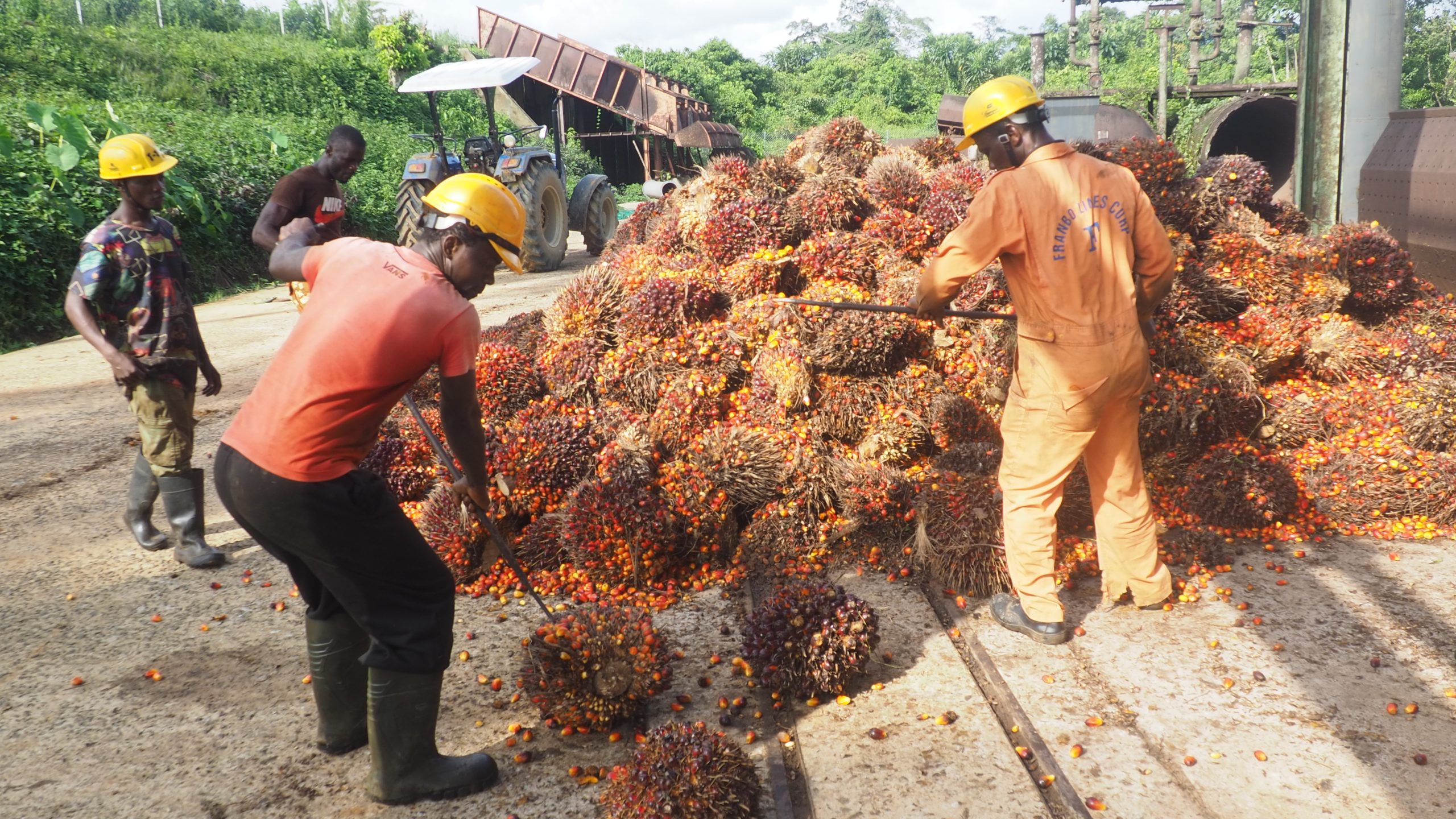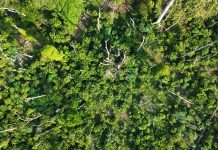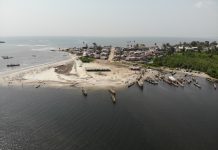Top: Liberia Natural Produce Incorporated’s workers at a renovated prewar palm oil mill in the Tarsue Chiefdom of Sanquin District, Sinoe County. The DayLight/Varney Kamara
By Varney Kamara
KOMMANAH TOWN, Sinoe County – After nearly four years of illegal occupancy, villagers in a southeastern chiefdom are demanding the departure of an oil palm company from their ancestral land.
Early this month, aggrieved residents from various clans and sections in the Tarsue Chiefdom of Sanquin District, Sinoe County staged a peaceful protest at the headquarters of Liberia Natural Produce Incorporated (LNPI), an Indian-Liberian investment, demanding its immediate withdrawal from their land.
In a six-count petition, locals accused LNPI of intruding on their land and intimidating residents.
“Based on these reasons, the citizens of Tarsue, including elders, women, youth, and traditional leaders, will not sign any agreement with Liberia Natural Produce Incorporated,” the petition stated. “The citizens of Tarsue demand that LNPI leave the plantation so that we can develop our land and improve our livelihoods.”
Representative Alex Noah, whose electoral district Tarsue falls, has appealed for one month to mediate the dispute. Locals granted his appeal, temporarily easing the tension, and suspended a three-day ultimatum for the company to evacuate the palm estate. However, residents have vowed to resume their protest once the negotiation period expires.
“After the one-month grace period requested by the honorable representative, the company must either leave our land or face escalated community action,” said Ericson Pyne, the chief spokesperson of Tarsue in Kommanah Town, Tarsue’s headquarters.
“LNPI must leave,” Pyne told The DayLight. “We have endured their presence for over three years, and they cannot fulfill their obligations. The community is prepared to take further steps if necessary.”
Noah’s intervention differs sharply from Superintendent Peter Wleh Nyensueh’s solution. Last October, Nyensueh dismissed the locals’ demand that LNPI vacate the plantation, claiming chiefs and elders had waived by signing an initial MoU with LNPI. But he was wrong as the MoU he cited was for LNPI to purchase locals’ palm oil, not to acquire the plantation.
‘We Cannot Keep Fighting Forever’
Amid the dispute, LNPI has expressed willingness to negotiate with the community. Acknowledging challenges since its arrival, the company promised improvements should negotiations resume.
“The community is our landlord. We have to negotiate and find a peaceful resolution,” said Baccus Wiah, LNPI’s spokesperson. “We cannot keep fighting forever.”
Wiah’s comments are a turnaround from the company’s previous stance. Until now, LNPI has failed to recognize the community’s right to the land and required consent, even though he admits that the company operates illegally.
Initially welcomed by locals as a much-needed investor, LNPI’s presence in Tarsue quickly turned sour, leading to rising tensions and confrontations. The company had hidden its intent to purchase the plantation, signing an oil purchasing MoU with chiefs and elders instead.
But a series of DayLight investigations last year shed light on LNPI’s deception and illegality, inspiring the community to hold LNIP accountable.

Shrouded in Secrecy
In February 2022, Konnex Investments Limited, LNPI’s parent company, purchased an abandoned palm plantation from Equatorial Palm Oil (EPO) for US$445,000. However, the agreement has not been approved by the Liberian government, and the community did not consent to LNPI’s operations.
Despite guidance from the Liberia Land Authority, LNPI pushed ahead with its operations, violating the Land Rights Act of 2018, which mandates community approval before land occupation. The law grants communities the right to own and manage land based on customary practices.
Moreover, the deal was poorly publicized, with only a LinkedIn post, a mention on LNPI’s website and references hidden in EPO’s parent company’s annual reports.
Tarsue residents only became aware of the deal in March 2023—nine months after LNPI convinced them to sign a six-month oil palm purchasing agreement. The MoU allowed LNPI to buy a five-gallon container of palm oil for L$1,300 and L$1,500.
The company paid the community US$6,000 and paved a major road but the deal lasted three months beyond the agreed period.
Despite warnings from locals about the MoU violations, LNPI continued its operations unchecked, provoking community anger. Since then, LNPI has forcibly controlled the plantation, including renovating a prewar palm oil mill. Backed by armed police officers, it evicted residents, ignoring their land ownership rights and the legal requirement for consent.





Facebook Comments